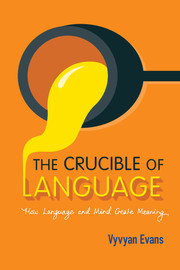Book contents
- Frontmatter
- Dedication
- Epigraph
- Contents
- List of figures
- List of tables
- Preface
- Acknowledgements
- I The ineffability of meaning
- II Meaning in mind
- Chapter 3 Patterns in language, patterns in the mind
- Chapter 4 Time is our fruit fly
- Chapter 5 Concepts body forth
- Chapter 6 The concept-making engine (or how to build a baby)
- Chapter 7 The act of creation
- III Meaning in language
- Epilogue: The golden triangle
- Notes
- References
- Index
Chapter 5 - Concepts body forth
from II - Meaning in mind
Published online by Cambridge University Press: 05 November 2015
- Frontmatter
- Dedication
- Epigraph
- Contents
- List of figures
- List of tables
- Preface
- Acknowledgements
- I The ineffability of meaning
- II Meaning in mind
- Chapter 3 Patterns in language, patterns in the mind
- Chapter 4 Time is our fruit fly
- Chapter 5 Concepts body forth
- Chapter 6 The concept-making engine (or how to build a baby)
- Chapter 7 The act of creation
- III Meaning in language
- Epilogue: The golden triangle
- Notes
- References
- Index
Summary
Any account of the human mind has to grapple with the nature of concepts, the subject of this chapter. After all, concepts are the foundation of our mental life, and play a central role in our meaning-making capacity. For without concepts that could be no thought; moreover, language would have nothing to express. Love, Freedom, Peace, and even Superman are all concepts. A considerable amount of ink has been spilled by philosophers of mind over the nature of concepts, often with perhaps startling conclusions. As I observed in Chapter 2, the philosopher Jerry Fodor is famous – or rather infamous – in certain circles for having claimed that concepts are innate; we come into the world pre-equipped with a mental store of concepts, ranging from Pineapple to Porcupine, from Molecule to Atom, and everything in between, even the concept for Doorknobs! While we can be fairly confident that babies aren't born with the concept of Doorknobs – and even Fodor has recanted in his later work – it is far from clear what concepts are like.
To my knowledge, no one's ever seen a concept. So we have to infer what they might be like from the language we use, from the way we think and act, and from how we categorise our environment as we experience it. For concepts are central to everything, or nearly everything, that's significant about the mental life of human beings. They populate our conceptual system: our repository of knowledge.
Søren Kierkegaard, the Danish philosopher, made the following observation: ‘Concepts, like individuals, have their histories and are just as incapable of withstanding the ravages of time as are individuals. But in and through all this they retain a kind of homesickness for the scenes of their childhood’. Concepts come and go, and are born and die.
Take the concept Phlogiston, which you may be excused from not having come across until now. Phlogiston was thought to be an odourless, colourless substance without weight. It was said to be given off in burning by all flammable materials. As likely as not, you won't have heard of this mysterious substance before. And this is precisely because the theory of combustion assumed by alchemy, which it was part of, had, by the end of the eighteenth century, been overturned, with the arrival of the modern science of chemistry.
- Type
- Chapter
- Information
- The Crucible of LanguageHow Language and Mind Create Meaning, pp. 95 - 121Publisher: Cambridge University PressPrint publication year: 2015



